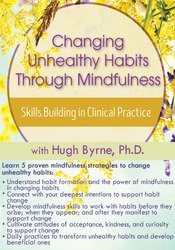

Learn 5 proven mindfulness strategies to change unhealthy habits:
Our clients often have unhealthy habits that can be hard to change. This seminar will help you understand habits, how they form, and why they can be hard to change, and provide tools to identify and change unhealthy habits.
The seminar will help you recognize and interrupt patterns of suffering that come from habits—whether of excessive thinking and worrying, compulsive or addictive behaviors, or reactive behaviors in relationships—and share this knowledge and practices.
With your support, your clients will learn that even deeply entrenched habits can be changed through mindfulness; attend Dr. Byrne’s powerful seminar & learn skills and practices to begin the process of abandoning unhealthy habits and cultivating more beneficial ones.
This online program is worth 6.25 hours CPD.
| File type | File name | Number of pages | |
|---|---|---|---|
| Manual (5.46 MB) | 46 Pages | Available after Purchase |
Hugh Byrne, PhD, is a guiding meditation teacher with the Insight Meditation Community of Washington. He has practiced meditation for 30 years and been teaching mindfulness meditation since 2000. He completed a four-year meditation teacher training program led by Jack Kornfield and Joseph Goldstein at the two major insight meditation centers in the U.S. Hugh is trained in and teaches mindfulness-based stress reduction and completed a three-year training in Somatic Experiencing, a mind-body approach to healing trauma. He has a law degree from London University and a Ph.D. from UCLA. He teaches retreats and workshops in the United States and internationally and is the author of The Here-and-Now Habit: How Mindfulness Can Help You Break Unhealthy Habits Once and for All.
Speaker Disclosures:
Financial: Hugh Byrne is cofounder of Meditation Teacher Training Institute (MTTI). He is an author for New Harbinger Publications and receives royalties. Dr. Byrne receives a speaking honorarium from PESI, Inc. He has no relevant financial relationships with ineligible organizations.
Non-financial: Hugh Byrne has no relevant non-financial relationship to disclose.
Habits and the Role of Mindfulness in Habit Change
The Power of Intention
Harness Attention to Effect Habit Change
Cultivate Attitudes that Support Habit Change
Bring it All Home
| 5 |
|
| 4 |
|
| 3 |
|
| 2 |
|
| 1 |
|
Satisfaction Guarantee
Your satisfaction is our goal and our guarantee. Concerns should be addressed to info@pesi.co.uk or call 01235847393.
Please wait ...